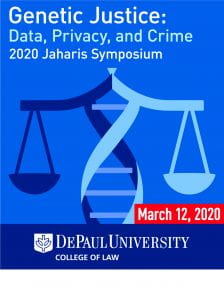On March 12, The Mary and Michael Jaharis Health Law Institute holds its annual Symposium on Health Law and Intellectual Property entitled Genetic Justice: Data, Privacy, and Crime. The symposium brings scholars from around the country to discuss emergent substantive justice issues surrounding the rapidly-innovating research genetics and genomics industries. Professor Valerie Koch, Jaharis Faculty Fellow and Director of Law and Ethics at the University of Chicago’s MacLean Center for Clinical Medical Ethics, is the symposium’s principal organizer.
While advances in genetic technologies have raised a host of issues related to privacy and informed consent, Professor Koch sought to reach broader issues at this year’s symposium. “There’s always been — especially within the United States — an emphasis on autonomy, informed consent, personal decisionmaking, and individuality. There’s been less focus on one of the other key principals of bioethics – the principal of justice.”
“We’re trying to tell a story from collection to use, through this justice lens,” Professor Koch said of symposium’s agenda. The panelists and speakers for this year’s symposium bring a wealth of experience in research ethics, law enforcement, technology, and the law, which they will bring to bear on issues of distributive and procedural justice in genetics and genomics.
Rather than take the more limited view examining how individuals interact with genetic technologies, the purpose of the symposium is to zoom out and consider these implications as they affect entire populations. As genetic testing becomes more prevalent, how can we ensure that everyone who needs it has access to it? How do we make sure that research databases reflect the populations they will be used to understand?

Some of these questions arise before any data is collected or research conducted. As these new technologies have potentially large impact on patient decisionmaking, the process of setting research priorities benefits from robust, transparent debate. The first panel of the day discusses justice in the context of acquisition of genetic information in the formation of genetic databanks, and features legal scholars and bioethicists. Panelists will discuss the challenges and implications of striving for inclusion and representation in genetics research.
The morning also features a panel on justice issues related to informed consent and privacy in the use and control of genetic information. Panelists will discuss the implications to consumers of having their genetic information shared or sold between researchers, and what informed consent looks like in that context.
This year’s featured speaker is Sheila Jasanoff, JD, PhD, Pforzheimer Professor of Science and Technology Studies at Harvard Kennedy School of Government, where her work has focused on the intersection of science, technology and the law. A prolific scholar, Dr. Jasanoff has written about a range of topics including the limits of applied science in the courtroom, the blurry legal status of embryos across countries, and the risks of pushing the limits of genetic therapies without transparency and inclusive debate.
Whereas the morning focuses on the collection and control of genetic data, the afternoon focuses on the implications of some of its contemporary uses. The third panel of the day focuses on the use of genomics in the justice system. The panelists will explore the current applications for genomics in the justice system, along with potential new ones.
Narrowing the scope further, the final panel of the symposium focuses on the use of genealogical data to solve crimes. Emergent genealogical technologies have led to arrests in a number cold cases, most notably the Golden State Killer case. There, law enforcement tested DNA found at various crime scenes over the years against an open-source genealogical database set up by the Mormon church. Investigators were able to identify several of the suspects family members, eventually leading to a warrant and an arrest. The panel will discuss these tools and their implications, both to the criminal justice system and to broader society.
The symposium will be held on March 12th, on the 10th floor of the DePaul Center. CLE credit is available. Register here.